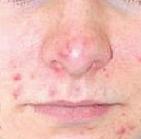The Idea behind Vitamin B5 for Acne Treatment
| Share on Facebook | Share on Twitter | Share on Google+ |
There have been many studies in the recent years aimed at finding out what the exact relationship is between vitamin B5 and acne.
As you may already know, vitamin B5, commonly referred to as pantothenic acid (also referred to as panthenol and calcium pantothenate) is one of the most important essential nutrients in the body. It is important for everyday growth, for reproduction and is used in many physiological processes in the body.
It is involved in much too many bodily functions, which include the making and production of fats, hormones, neurotransmitters, hemoglobin, among many others.
Vitamin B5 also helps the body to absorb and properly utilize a range of other vitamins, including B6, B12 and C.
Vitamin B5: Acne Cure?

While pantothenic acid (B5) is richly found in many natural food sources, it is included in most vitamin and mineral supplements, usually in combination with other B complexes.
However, in the recent years, pantothenic acid supplements have gained popularity. Where does this vitamin B5 pantothenic acid popularity come from?
Theory behind Pantothenic Acid Treatment for Acne
The most widely publicized benefit of pantothenic acid is for acne treatment. This ides of vitamin B5 for acne treatment is based on many theoretical premises.
Basically, the primary cause of acne is a defect in a person's proper metabolism of fats - which is in turn caused by the lack of the vitamin B5-synthesized coenzyme A in the body.
With too little CoA, the fats in the body do not get broken down but get deposited into your sebaceous glands. When this happens, they get secreted as sebum or oil. Thus acne bastes in the pores feeds on these oil excesses, causing the breakouts.
With vitamin B5 pantothenic acid supplementation, oil production gets shut down, your pores gets dried up and your acne is reduced significantly.
Taking more patothenic acid means more coenzyme A produced that counters deposition of fats into the oil glands. Based on the same theory, vitamin B5 helps fight facial oiliness.
Vitamin B5 Dosage for Acne
Regular pantothenic acid for acne treatment usually comes as 500 milligram capsule or tablets. For acne reduction, vitamin B5 has to be taken with a dosage of at least 5 grams, and some people take as much as 20 grams. The only reported side effects are diarrhea and rare cases of heartburn or nausea.
There are not many studies to scientifically prove the effectivity of pantothenic acid supplements against acne. However, the overwhelming number of people who use them and the positive feedback from them are encouraging and inviting enough to use vitamin B5 for acne treatment. Acne treatment through vitamin B5 or pantothenic acid is natural and risk-free, making it ideal and safe for everyone.
-
Skin CareMen Skin Care
-
Free ResourcesFree eBooks
-
Every human being is the author of his own health or disease.Buddha
-
Featured Health SupplementYou will find highly beneficial ingredients in Total Balance
 which are quite rare in other supplements either due to cost, or the need to protect them via enteric coating. Such as L-Glutathione, Resveratrol, RNA, ATP…and many more.
which are quite rare in other supplements either due to cost, or the need to protect them via enteric coating. Such as L-Glutathione, Resveratrol, RNA, ATP…and many more.
-



















